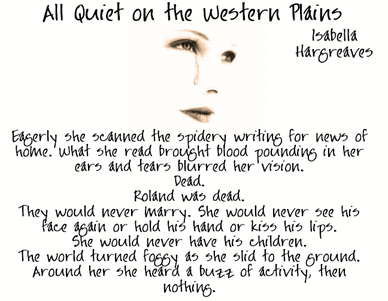 Join me on tour 15-21 May to launch All Quiet on the Western Plains. As usual there's a book giveaway drawn at the end of the tour. "One war, two battle-scarred hearts, one chance for happiness. " First stop is: http://bookwormbridgette.blogspot.com/2014/05/blog-tour-all-quiet-on-western-plains.html
1 Comment
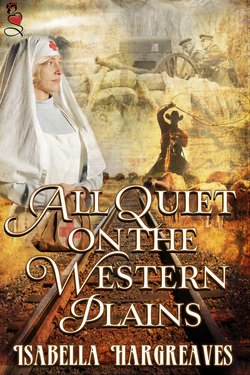 It gives me great pleasure to announce the release of my historical, rural romance - All Quiet on the Western Plains - set in western Queensland, Australia in 1924. "One war, two battle-scarred hearts, one chance for happiness." English nurse, Fleur Armitage, wants to escape all reminders of the Great War, which killed family and friends; by living as far from its reminders as possible - in outback Queensland. Jack Edgarson is a pastoralist, war hero and damaged man. Suffering from nightmares and sleep walking, he lives in isolation, fearful he may harm someone. Through a chance meeting, their lives become entangled. They come to share their love of the wide western plains, but dare they love each other? Available from Amazon and all good ebooksellers. 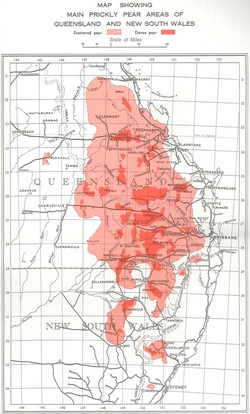 Source: A P Dodd, 1940. Source: A P Dodd, 1940. During the 1920s, the biggest concern for many people in country Queensland, aside from the weather, was the rapid spread of the pest cacti commonly known as prickly pear. From Mackay in central Queensland to central New South Wales, these plants were multiplying and choking the land. They had been introduced into Australia from North and South America during the nineteenth century. Warnings of their capacity to multiply and make good land useless began in the 1870s, but it wasn't until the 1890s that bylaws and legislation requiring their removal were created. By the early twentieth century, the need for a biological control of the pest had been recognised. Although an effective poison to kill the cacti was determined in 1916, obtaining it during World War One was difficult and Australia's manpower and the money to control prickly pear were employed overseas. Finally, in 1919, the Commonwealth Government and the governments of Queensland and New South Wales established a joint project, to discover and introduce into Australia biological pests of prickly pear, to control its spread. Achieving this goal was to take 10-20 years, but the introduction of Cactoblastis cactorum and a number of other parasites of the cacti, was an outstanding success. Not all of Queensland was affected by prickly pear. Open plains were generally spared the infestation - among them the plains of western Queensland. It is here that my latest book, All Quiet on the Western Plains is set. The characters therefore weren't involved in the struggle to control prickly pear that was going on in much of rural Queensland in 1924. Does your family have a story from the bad old days of Prickly Pear? I would love to hear from you. All Quiet on the Western Plains - available 1 May 2014 - from Amazon, Steam eReads and Book Srand. References: Dodd Alan P. The progress of biological control of prickly pear in Australia. Commonwealth Prickly Pear Board, Brisbane, 1929. Dodd Alan P. The biological campaign against prickly-pear. Commonwealth Prickly Pear Board, Brisbane, 1940. Dodd, Alan P. ‘The Conquest of Prickly-Pear’. RHSQJ, 1945, 3, 5, pp. 351-61. Mann, John. The Naturalised Cacti in Australia, Queensland Lands Department, Brisbane, 1970. 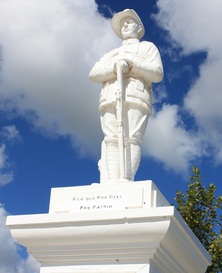 WWI memorial, Crows Nest, Qld. WWI memorial, Crows Nest, Qld. With the hundredth anniversary of the start of World War One approaching, I have been reading lots of autobiographies and biographies of soldiers and nurses who served in Europe and the Middle-East. A few months ago all this reading sparked the idea for my forthcoming novella, All Quiet on the Western Plains. English nurse Fleur Armitage wants to escape all reminders of the Great War, which killed family, friends and patients - by living as far from its reminders as possible - in outback Queensland, Australia. Jack Edgarson is a war hero, pastoralist and damaged man. Suffering from nightmares and sleep walking, he fears he may harm someone, so lives in isolation. Through a chance meeting, their lives become entangled. They come to share a love of the wide western plains, but dare they love each other? For some World War One autobiographies and biographies, see my sources page on this website. All Quiet on the Western Plains – available 1 May 2014 – from Steam eReads and Amazon. This week, join three more talented authors as they talk about their writing process...
Heather Kinnane is the author of fantasy and romance, living in the island state of Tasmania, Australia. With a fascination of all things magical and mysterious, it's no wonder her stories contains elements of the Otherworld as she weaves tales that introduce readers to the beautiful landscapes of her island home. Her blog can be found here: http://heatherkinnane.com/news/ Elizabeth M Darcy author of Historical Romance. From Knights in shining armour to Highlanders and English rakehells, Elizabeth takes her readers on a romantic journey through history with deliciously handsome heroes and strong heroines. Find her blog at: http://elizabethdarcyauthor.blogspot.com.au/ Kris Ashton has been a journalist since 1998. In 2005 he sold his first short story and two years later he published his first novel, a paranormal romance called Ghost Kiss. Kris’s novel Hollywood Hearts Ablaze will be released in March 2014. See his blog at: http://kris-ashton.wix.com/spec-fic#!My-Writing-Process-Blog-Tour/c13oz/D4F51678-5FC2-470C-9FC8-7B567E537295  Today, it’s my turn in the My Writing Process Blog Tour, where authors and writers answer questions about their writing process. Last week, my friend, Noelle Clark, Australian author of the wonderful contemporary romances Let Angels Fly and Rosamanti wrote about her writing process. You can read more here: www.noelleclark.blogspot.com.au This week, you can read not only my post but those of Kendall Talbot and Susanne Bellamy. Everyone has their own unique way of writing. With the help of a few questions, I’ll talk about mine. 1) What am I working on? Currently I’m working on revisions to my historical romance, Colonial Cousin, set in convict NSW and Regency England. This is a story I wrote many years ago and have heavily revised in the last year. The way in which I have worked on it certainly doesn’t reflect my writing process for The Persuasion of Miss Jane Brody, my recent historical romance set in Regency England. For that book, I plotted it out, knew the character motivations and development, then I wrote it. I wrote in short bursts for the first five chapters, fitting writing in between full-time work and family time, then did an intense burst of writing to finish it while on annual leave for four weeks. A few months of revisions followed. 2) How does my work differ from others of its genre? Like other writers, I try to take the reader into the historical period in which the story is set and into the minds of the characters so that they can relate their story. I’ve been told that my work differs from others in its genre by including social commentary in a historical romance. Certainly, in The Persuasion of Miss Jane Brody, women's rights and their sphere are important component. 3) Why do I write what I do? I write stories that come from an idea for a character or from an interest in a particular time period I want to explore. I try to write stories that I want to read. For me, that means believable characters, period-appropriate dialogue, motivations and plots. 4) How does your writing process work? As I’m a plotter, I like to know where my story is going to end up, the character arcs and at least a basic sketch of how I’m going to get there, before I start. Therefore, I spend quite a bit of time on working out the background, although I have been known to write a first chapter with only the most rudimentary outline of the story worked out, because I just have to get my initial idea down in writing. The rest flows from there... Next week, you will meet some of my fellow Steam eReads authors, each of whom writes in different ways and genres: Heather Kinnane is the author of fantasy and romance, living in the island state of Tasmania, Australia. With a fascination of all things magical and mysterious, it's no wonder her stories contains elements of the Otherworld as she weaves tales that introduce readers to the beautiful landscapes of her island home. Her blog can be found here: http://heatherkinnane.com/news/ Elizabeth M Darcy author of Historical Romance. From Knights in shining armour to Highlanders and English rakehells, Elizabeth takes her readers on a romantic journey through history with deliciously handsome heroes and strong heroines. Find her blog at: http://elizabethdarcyauthor.blogspot.com.au/ Kris Ashton has been a journalist since 1998. In 2005 he sold his first short story and two years later he published his first novel, a paranormal romance called Ghost Kiss. Kris’s novel Hollywood Hearts Ablaze will be released in March 2014. See his blog at: http://kris-ashton.wix.com/spec-fic#!blog/chun 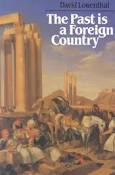 Many years ago, David Lowenthal* wrote that the past is a foreign country. It has a different language and culture. If, as authors of historical novels, we are to operate convincingly in that place, we need to learn the language and culture. The best way that I know of to achieve this is through immersion in the period. I read broad histories of the period, for an understanding of it in overview; a multitude of web-based sources; and autobiographies and biographies, rich with the voices of the time through quotation. Autobiography and biography let people from the past speak to us in their own words. They reveal cultural morés, emotions and thoughts. They provide detail! The insight into the people, place and Zeitgeist of the period provided by these primary sources is gold. Dig for it. Mine it. The time required to do so is worth the effort. Your stories will have the ring of authenticity that readers will love. My 2013 novel, The Persuasion of Miss Jane Brody, was inspired by a biography of Mary Wollstonecraft, which led me to ask a number of ‘what if’ questions, such as "How would a woman who believed, like Wollstonecraft, in the equal rights of women and advocated educating girls, cope with falling in love; not with an intellectual like herself, but with a conservative aristocrat?" I just burned to tell that story. Such is the power of biography and autobiography to illuminate and inspire; and readers appear to like this approach too. * David Lowenthal, The Past is a Foreign Country, Cambridge University Press, Cambridge, 1985. (multiple reprints) A great 5 star review for The Persuasion of Miss Jane Brody from Crystal's Many Reviewers. If you're interested, check it out at http://crystalsmanyreviews.blogspot.com/2014/01/the-persuasion-of-miss-jane-brody-tour.html?zx=5ce55f1391870985 (includes a book giveaway) or on the news and events page of my website.
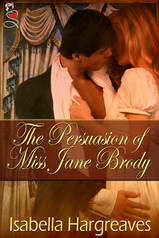 Featuring The Persuasion of Miss Jane Brody, join me on tour from 16-20 January 2014 with Dreams Come True Promotions. Details coming soon. The Persuasion of Miss Jane Brody is set in Regency England. Jane Brody is a passionate follower of Mary Wollstonecraft's beliefs about the rights of women. She campaigns for better education and employment opportunities for girls so they can be independent of men. Jonathan Everslie, Marquis of Dalton, needs a wife and heir, but can't find a woman who doesn't bore him. Then he meets Jane Brody. He finds her attractive, but her politics dangerous. Will Dalton risk his political career to win Jane’s love and persuade her that they belong together? Available now from Steam eReads: http://steamereads.com.au/product/the-persuasion-of-miss-jane-brody/ or download from Amazon. |
Archives
June 2024
Categories
All
|

 RSS Feed
RSS Feed